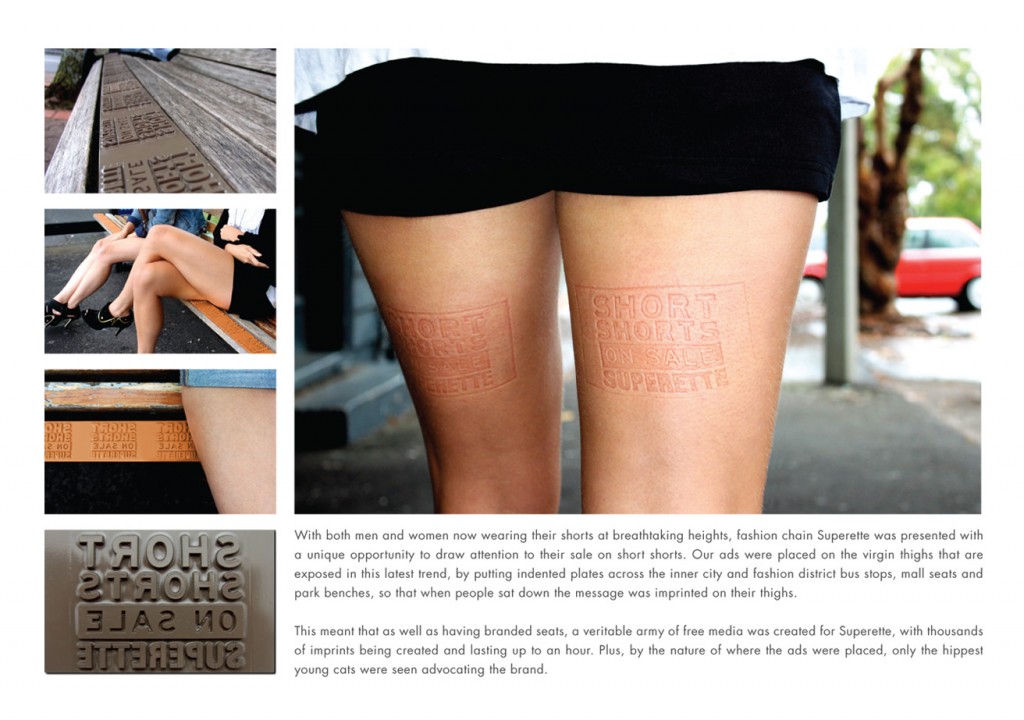Nicole Lemas
April 21, 2011
The focus of my paper will be on the objectification of women through the outlet of media.
“The Body As Cultural Text” by Lisa Wade, March 16, 2011
“Ambient advertising may have that same message and/or images as traditional advertising but it seeks to have interaction with its environment or given location."
The ambient advertising seen in this post is one of a woman’s legs being impressioned by a park bench about a sale on ‘short shorts.’ She herself was wearing short shorts, sat down for a while on the bench and then stood up and walked away as a literal billboard. What shocked me in this ad was the lack of humanness in the object, who was in fact a human. It was like watching a piece of clothing being branded and going on the conveyor belt for final production. The frame of the ad was from the behind, from the waist down. What I see from this framework is how media has compartmentalized the female body. We no longer see the whole of the woman; we must break her down only to represent her thighs, buttocks and breasts all separately. This makes it so much easier to objectify women if we can’t even see the totality of them!
Advertising reflects a social norm or else we would not be attracted to it. This social norm is so subtle yet dangerous. It makes the woman compliant with the reality that her body is not hers. It is for sale, on sale, at the discretion of the consumer. This lack of humanness in advertising leads to more socially accepted norms such as violence against women. If we cannot see the woman as a whole, whom is capable of so much more than what her body represents, we can justify any harm we do to it. This is a very disheartening way to see how advertising and our acceptance of it perpetuates the inferiority of women.
“Finally a Women’s Movement Men Can Get Behind” by Lisa Wade December 9, 2009
http://www.youtube.com/watch?v=7bMcFAER3mE&feature=player_embedded The movement for eradicating women’s breast cancer is something well supported and well publicized. In this clip from ‘Men For Women Now’ in support of the National Organization for Women we see how even a serious issue such as cancer is belittled to merely a parody. Kevin Connolly’s message is humorous, his tone brash and his time obviously short. Yet in this :47 second clip he clearly is able to celebrate women’s objectification. By switching the word “breast” with “boobs” it creates the issue at hand to be one of inanimate importance. There was no reality shared in this clip about the struggles of the disease and the deep sorrow women have after losing their breasts. If anything it was a slap in the face from a man who has no clue the fragile uncertainty these women face. As the author stated “they are people, not just tits!” So again, we see that women are inanimate objects even in the face of very daring times. And to be covered up as a man speaking out for an organization being in support of this cause? That’s the real joke.
“How Objectification of Women Makes Women Hate Each Other”
by Linda Wade, July 13, 2008
I just wanted to begin by sharing how shocked I was that they even have TV shows like this! Where women try to guess in what order men will rank them according to their face, their body, and both. The author stated that “how being objectified places women in competition with each other and, thus, creates conflict and antagonism. Thus, women are “catty” because of gender inequality, NOT because of those two pesky X chromosomes or something to do with hormones.”
It begins with the men ranking the women behind a glass window and the women deciding what the men perceive as attractive and ranking themselves from there. To start, the set-up of the show is exactly the point of these related articles. By keeping women at a distance and blatantly objectifying them on their physical appearance men obtain and sustain all the power. I felt like the women were lab rats being tested, and they all passed! They passed the realization that women are in fact insecure about their bodies and will continue to be so because we base our worth on what other people think of us. We can no longer find our own unique, inherent beauty because if we compare our “parts” to others, we won’t match up. What we see in this clip is the length women will go to to “claw” their way back up to some power (all being based in the worth of their looks). All the while the men sit back and make a spectacle of the show and enjoy the women fighting for their approval. Sick.